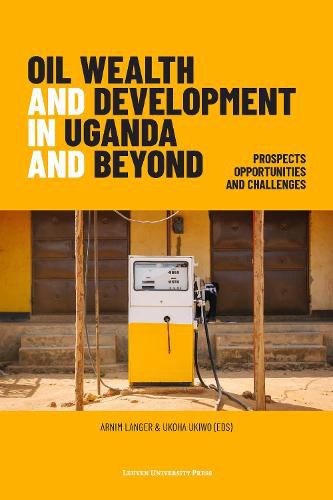Readings Newsletter
Become a Readings Member to make your shopping experience even easier.
Sign in or sign up for free!
You’re not far away from qualifying for FREE standard shipping within Australia
You’ve qualified for FREE standard shipping within Australia
The cart is loading…






This title is printed to order. This book may have been self-published. If so, we cannot guarantee the quality of the content. In the main most books will have gone through the editing process however some may not. We therefore suggest that you be aware of this before ordering this book. If in doubt check either the author or publisher’s details as we are unable to accept any returns unless they are faulty. Please contact us if you have any questions.
Large quantities of oil were discovered in the Albertine Rift Valley in Western Uganda in 2006. The sound management of these oil resources and revenues is undoubtedly one of the key public policy challenges for Uganda as it is for other African countries with large oil and/or gas endowments. With oil expected to start flowing in 2021, the current book analyzes how this East African country is preparing for the challenge of effectively, efficiently, and transparently managing its oil sector and resources. Adopting a multidisciplinary, comprehensive, and comparative approach, the book identifies a broad scope of issues that need to be addressed in order for Uganda to realize the full potential of its oil wealth for national economic transformation. Predominantly grounded in local scholarship and including chapters drawing on the experiences of Nigeria, Ghana, and Kenya, the book blazes a trail on governance of African oil in an era of emerging producers. Oil Wealth and Development in Uganda and Beyond will be of great interest to social scientists and economic and social policy makers in oil producing countries. It is suitable for course adoption across such disciplines as International/Global Affairs, Political Economy, Geography, Environmental Studies, Economics, Energy Studies, Development, Politics, Peace, Security and African Studies.
Ebook available in Open Access. This publication is GPRC-labeled (Guaranteed Peer-Reviewed Content).
Contributors: Badru Bukenya (Makerere University), Moses Isabirye (Busitema University), Wilson Bahati Kazi (Uganda Revenue Authority), Corti Paul Lakuma (Economic Policy Research Centre), Joseph Mawejje (Economic Policy Research Centre), Pamela Mbabazi (Uganda National Planning Authority), Martin Muhangi (independent researcher), Roberts Muriisa (Mbarara University of Science and Technology), Chris Byaruhanga Musiime (independent researcher), Germano Mwabu (University of Nairobi), Jackson A. Mwakali (Makerere University), Tom Owang (Mbarara University of Science and Technology), Joseph Oloka-Onyango (Makerere University), Peter Quartey (University of Ghana), Peter Wandera (Transparency International Uganda), Kathleen Brophy (Transparency International Uganda), Jaqueline Nakaiza (independent researcher), Babra Beyeza (independent researcher), Jackson Byaruhanga (Bank of Uganda), Emmanuel Abbey (University of Ghana).
$9.00 standard shipping within Australia
FREE standard shipping within Australia for orders over $100.00
Express & International shipping calculated at checkout
This title is printed to order. This book may have been self-published. If so, we cannot guarantee the quality of the content. In the main most books will have gone through the editing process however some may not. We therefore suggest that you be aware of this before ordering this book. If in doubt check either the author or publisher’s details as we are unable to accept any returns unless they are faulty. Please contact us if you have any questions.
Large quantities of oil were discovered in the Albertine Rift Valley in Western Uganda in 2006. The sound management of these oil resources and revenues is undoubtedly one of the key public policy challenges for Uganda as it is for other African countries with large oil and/or gas endowments. With oil expected to start flowing in 2021, the current book analyzes how this East African country is preparing for the challenge of effectively, efficiently, and transparently managing its oil sector and resources. Adopting a multidisciplinary, comprehensive, and comparative approach, the book identifies a broad scope of issues that need to be addressed in order for Uganda to realize the full potential of its oil wealth for national economic transformation. Predominantly grounded in local scholarship and including chapters drawing on the experiences of Nigeria, Ghana, and Kenya, the book blazes a trail on governance of African oil in an era of emerging producers. Oil Wealth and Development in Uganda and Beyond will be of great interest to social scientists and economic and social policy makers in oil producing countries. It is suitable for course adoption across such disciplines as International/Global Affairs, Political Economy, Geography, Environmental Studies, Economics, Energy Studies, Development, Politics, Peace, Security and African Studies.
Ebook available in Open Access. This publication is GPRC-labeled (Guaranteed Peer-Reviewed Content).
Contributors: Badru Bukenya (Makerere University), Moses Isabirye (Busitema University), Wilson Bahati Kazi (Uganda Revenue Authority), Corti Paul Lakuma (Economic Policy Research Centre), Joseph Mawejje (Economic Policy Research Centre), Pamela Mbabazi (Uganda National Planning Authority), Martin Muhangi (independent researcher), Roberts Muriisa (Mbarara University of Science and Technology), Chris Byaruhanga Musiime (independent researcher), Germano Mwabu (University of Nairobi), Jackson A. Mwakali (Makerere University), Tom Owang (Mbarara University of Science and Technology), Joseph Oloka-Onyango (Makerere University), Peter Quartey (University of Ghana), Peter Wandera (Transparency International Uganda), Kathleen Brophy (Transparency International Uganda), Jaqueline Nakaiza (independent researcher), Babra Beyeza (independent researcher), Jackson Byaruhanga (Bank of Uganda), Emmanuel Abbey (University of Ghana).